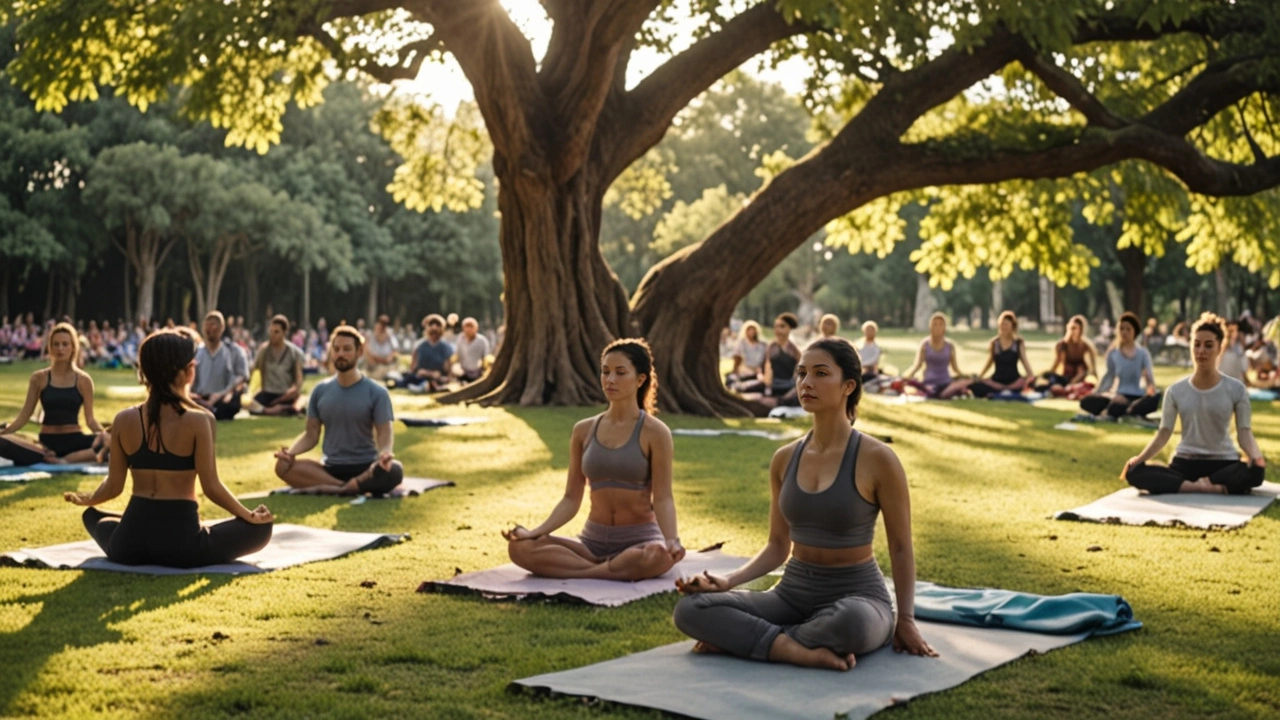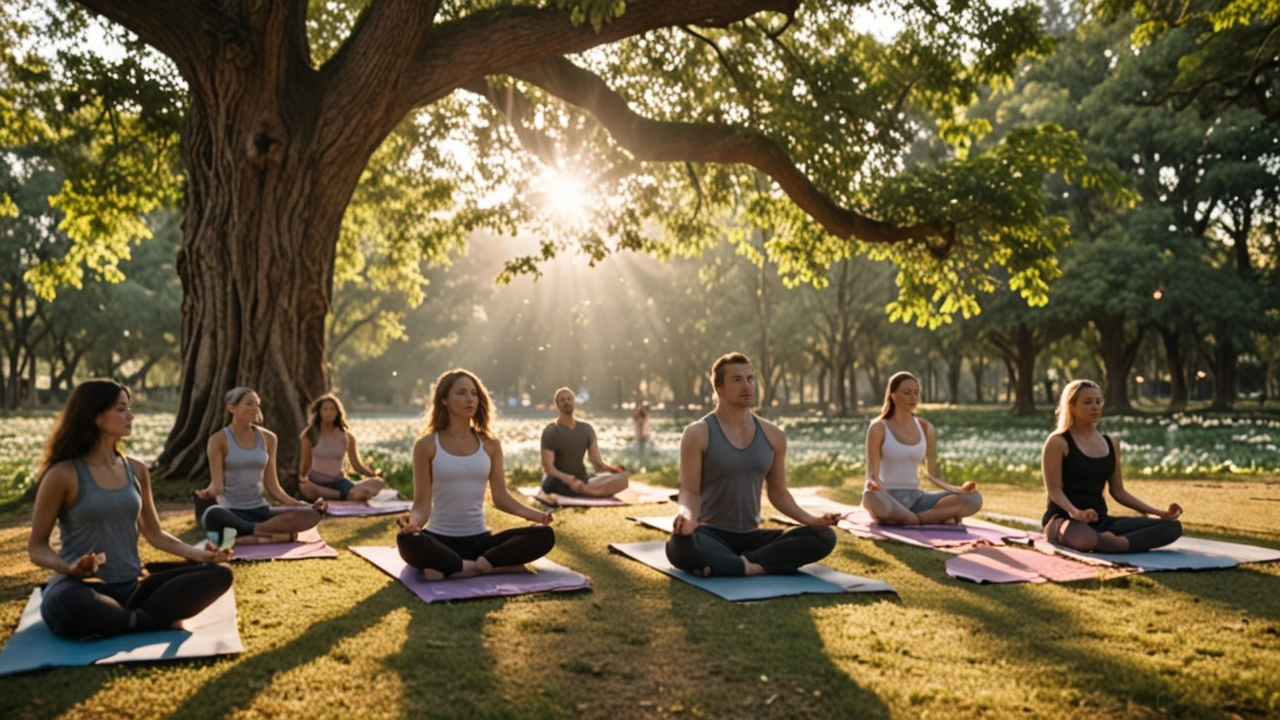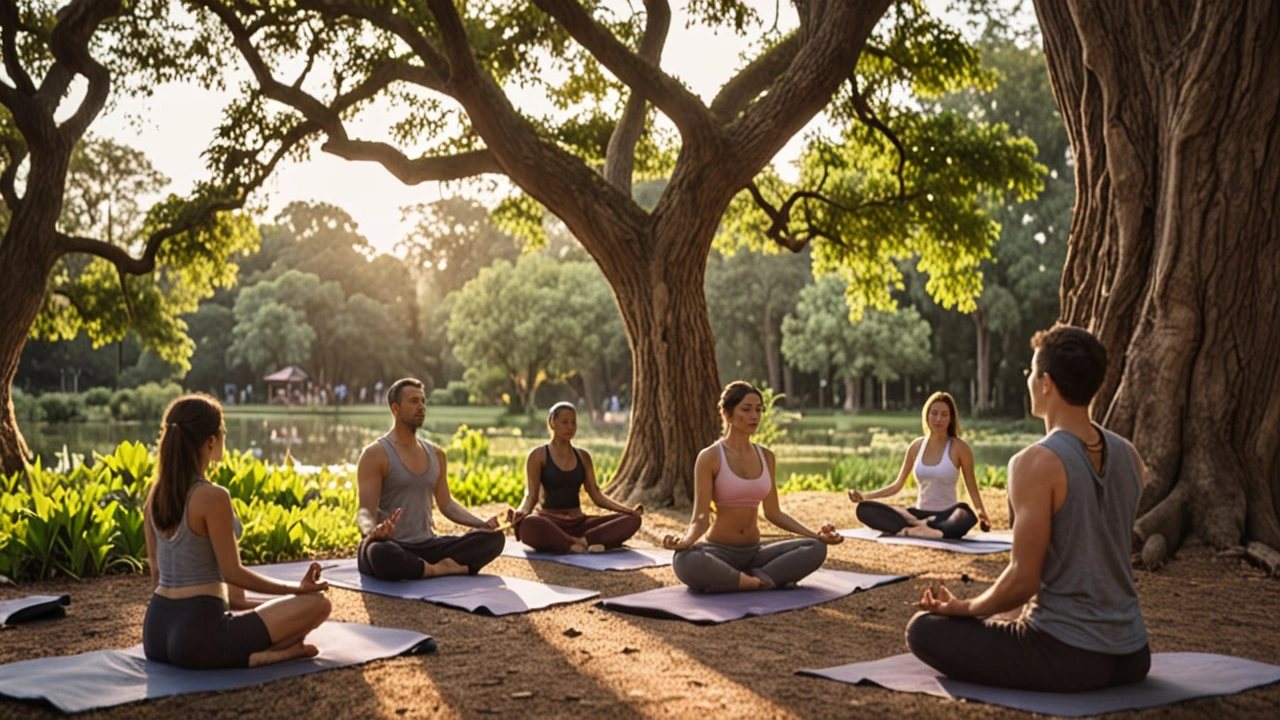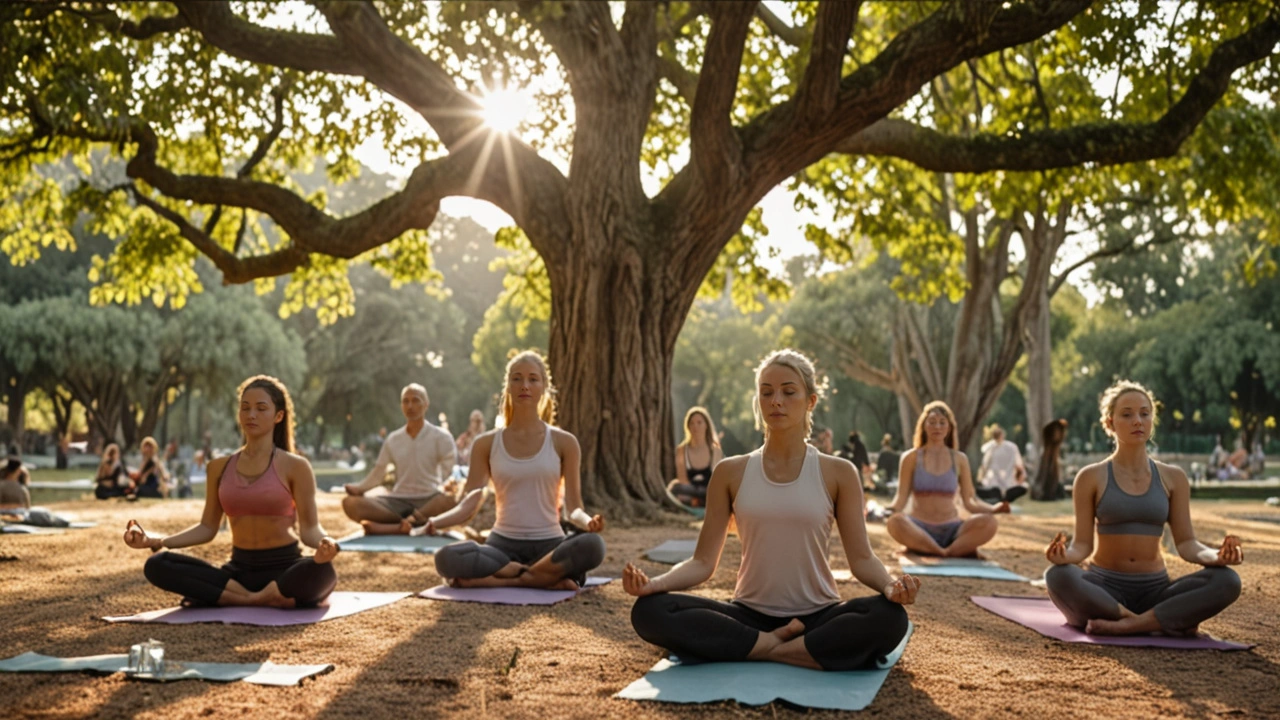Mindfulness has become a trending topic, but it's much more than a buzzword. At its core, mindfulness is about being fully present in the moment, aware of where we are and what we're doing, without being overly reactive or overwhelmed by what's going on around us.
When combined with meditation, mindfulness can transform the way we experience everyday life. Meditation is a practice that allows us to train our minds to focus and redirect our thoughts, enhancing our awareness of the present moment.
Understanding Mindfulness: Mindfulness is about paying attention on purpose, being in the present, and accepting our experience without judgment. It can be practiced at any moment of the day, whether through breathing exercises, mindful eating, or simply noticing the sensations around us.
- Understanding Mindfulness
- Benefits of Meditation
- Steps to Start Meditating
- Tips for Sustaining Your Practice
Understanding Mindfulness
Mindfulness is about being fully present and engaged with whatever we’re doing at the moment. It means not letting life pass by without living it, and not being absent-minded about the world around us. Imagine you're walking in a park. Instead of thinking about your grocery list or your next meeting, you pay attention to the rustling leaves, the chirping birds, the cool breeze against your skin. This is the essence of mindfulness.
Mindfulness emphasizes returning to the present moment, especially in a world where distractions are everywhere. Smartphones, social media, and the constant stream of information can pull our attention in countless directions. Practicing mindfulness helps in grounding us, pulling our attention back to what truly matters. This practice is rooted in ancient traditions, particularly Buddhism, yet it has been adapted and embraced in contemporary Western cultures for its mental and physical health benefits.
One of the key aspects of mindfulness is cultivating a non-judgmental awareness. Whether you're facing a stressful situation or enjoying a peaceful moment, mindfulness encourages you to observe without labeling your experiences as ‘good’ or ‘bad.’ This objective perspective can lessen the emotional intensity of our reactions and reduce stress. According to Jon Kabat-Zinn, the founder of the Mindfulness-Based Stress Reduction (MBSR) program, "Mindfulness means paying attention in a particular way: on purpose, in the present moment, and non-judgmentally."
Research supports the benefits of mindfulness in numerous ways. Studies have shown that regular practice can improve focus, reduce symptoms of anxiety and depression, and enhance overall emotional well-being. For instance, a study published in the journal Psychological Science found that mindfulness meditation can reduce mind-wandering and improve attention. This helps in making our daily activities more fulfilling and less stressful.
Mindfulness isn't just useful for mental health; it impacts physical well-being too. Practicing mindfulness can lower blood pressure, improve sleep quality, and even boost the immune system. Athletes and professionals have integrated mindfulness techniques to enhance their performance and resilience. For example, some NBA teams regularly include mindfulness routines in their training to help players stay calm and focused under pressure.
Whether you're new to mindfulness or revisiting the practice, remember it's not about achieving a particular state or clearing the mind of all thoughts. Instead, it's about observing thoughts and emotions as they come and go, without getting caught up in them. This simple shift in perspective can have a profound impact on how you navigate life's ups and downs.
Here are a few practical ways to start incorporating mindfulness into your daily life:
- Morning Routine: Begin your day with a few minutes of mindful breathing. Focus on the rhythm of your breath and sensations in your body as you breathe in and out.
- Mindful Eating: Pay attention to the texture, taste, and smell of your food. Savor each bite rather than rushing through meals.
- Mindful Walking: When walking, notice the feel of the ground beneath your feet, the movement of your legs, and your surroundings.
- Paused Moments: Take pauses throughout your day to check in with yourself. Notice how you're feeling, both physically and emotionally.
As you practice mindfulness, you'll likely notice a shift in how you approach daily activities and challenges. The moments of calm and clarity it brings can make a significant difference, improving both your mental and physical health.

Benefits of Meditation
Meditation isn't just an ancient practice; it's a tool that's been proven, through numerous studies, to offer tangible benefits for mental and physical health. Meditation, especially when done consistently, can be a game-changer in our moods and mindsets. What's fascinating is how simple acts of stillness and breathing can lead to profound changes.
One of the primary benefits of meditation is its ability to reduce stress. In our fast-paced world, it’s easy to get caught up in the daily grind, but meditation acts as a pause button. It helps lower the levels of cortisol, the stress hormone, which can enhance our overall sense of calm. According to a study published in JAMA Internal Medicine, mindful meditation programs can improve anxiety, stress, and pain.
Moreover, meditation has a positive impact on our emotional well-being. People who meditate regularly report feeling happier, more content, and more at peace with their lives. It enhances self-awareness, helps in recognizing negative patterns of thought, and can even foster a more compassionate outlook towards oneself and others.
Meditation is beneficial for our physical health, too. Regular practice has been linked with lower blood pressure, improved heart health, and even a stronger immune system. A study conducted by Harvard found that meditation can actually alter the physical structure of the brain, leading to increased gray matter concentration in brain regions involved in learning and memory, regulating emotions, and perspective-taking.
Boosts Attention and Concentration
Another compelling advantage is the improvement in attention and concentration. Meditation practices like mindfulness can train the brain to maintain focus and reject distractions. A study by the University of California, Santa Barbara, showed that even a short course of mindfulness meditation significantly improved students’ GRE reading-comprehension scores, which illustrates how effective it is at enhancing cognitive capabilities.
Enhances Sleep Quality
For those struggling with sleep issues, meditation can be a natural remedy. Regular meditation creates a state of relaxation that is conducive to deeper and more restful sleep. Insomnia and other sleep disorders can often be alleviated through consistent practice. This is especially crucial as sleep is fundamental for numerous bodily functions, including healing and cognitive performance.
"Meditation and concentration are the way to a life of serenity." - Ram Dass
The practice also promotes emotional health. Studies have shown that meditation can lead to changes in the brain structures associated with depression, creating a more positive outlook and better emotional resilience. This is particularly important for individuals who are dealing with emotional or mental health struggles as it offers a non-invasive, medication-free approach to managing their conditions.
Enhances Emotional Health
In addition to enhancing our emotional health, it can also sharpen our ability to remember things. As we age, cognitive decline becomes a concern, but meditation can help keep the brain young. A study from the University of California Los Angeles found that people who meditate have better-preserved brains than non-meditators as they age.
Lastly, the community aspect of meditation can't be overlooked. Many find solace and strength in meditating within a group, building connections, and sharing experiences. Whether it's through local meditation groups or online communities, there's a shared journey of self-discovery and growth that's deeply enriching.

Steps to Start Meditating
Starting a meditation practice can feel overwhelming, but it doesn't have to be. You don’t need any special equipment or extensive knowledge to begin. All you need is a quiet space, a comfortable position, and a few minutes each day to dedicate to the practice. Here’s a simple guide to help you take your first steps into the world of meditation.
Find a Quiet and Comfortable Space
Start by choosing a location where you won’t be disturbed. This could be a corner in your home or even a quiet spot in your backyard. The key is to find a place where you feel at ease. Ensure your chosen spot is free from distractions such as electronic devices or loud noises. You might want to add elements that promote relaxation, like cushions, soft lighting, or calming aromas.
Choose a Comfortable Position
Next, find a position that is both comfortable and sustainable. It's common to sit with your legs crossed on the floor, but you can also sit in a chair with your feet flat on the ground. Your back should be straight but not tense. Hands can rest on your knees or in your lap. The goal is to be in a position where you can remain alert yet relaxed. Some people prefer lying down, but be cautious as this could lead to falling asleep.
Focus on Your Breathing
Begin your practice by closing your eyes and taking a few deep breaths. Breathe in through your nose, hold for a few seconds, and then breathe out through your mouth. This helps signal your body to relax. Gradually, shift your focus to the rhythm of your natural breathing. Notice the sensation of the air entering and leaving your nostrils. If your mind starts to wander, gently bring your attention back to your breath.
Set a Time Frame
At first, meditating for long periods might seem unrealistic. Start small with just 3-5 minutes of meditation and gradually increase the duration as you become more comfortable with the practice. Setting a timer can be helpful. It allows you to focus on the meditation without worrying about the clock. Many beginners find it useful to use guided meditation apps, which can provide structure and support.
Be Patient and Consistent
Meditation is a skill that improves with regular practice. Don’t be discouraged if your mind feels busy or if you find it difficult to focus initially. This is a normal part of the process. Remember, the aim is not to clear your mind completely but to observe your thoughts without judgment. Consistency is key. Try to incorporate meditation into your daily routine, even if it’s just for a few minutes each day.
To quote Jon Kabat-Zinn, the founder of Mindfulness-Based Stress Reduction (MBSR):
“You can't stop the waves, but you can learn to surf.”
This means that while you can't control the challenges and situations life throws at you, you can learn to navigate them with greater ease through mindfulness and meditation. The journey to mindfulness through meditation is personal and unique to everyone. Embrace the process, and give yourself the grace to grow and learn. Happy meditating!

Tips for Sustaining Your Practice
Meditation is more than just a one-time activity; it’s a lifelong practice that requires persistence and dedication. Sustaining your meditation practice can result in profound changes in your mental and emotional well-being. Here are some practical tips to ensure you stay committed to mindfulness meditation over the long term.
First, establish a consistent routine. Pick a time of day that works best for you, whether it's early in the morning or before bedtime, and stick to it. Consistency helps create a habit. Think of it like brushing your teeth: once you integrate it into your daily routine, it becomes second nature.
Your environment plays a significant role in sustaining your practice. Designate a specific spot in your home for meditation. This place should be quiet, comfortable, and free from distractions. Having a dedicated space helps train your mind to associate that area with relaxation and focus, making it easier to slip into a meditative state.
Start small and gradually increase your meditation time. Even just five minutes a day can make a difference when you’re beginning. As you grow more comfortable with the practice, slowly increase your sessions by a few minutes each week. This incremental approach makes the habit more sustainable and less daunting.
It's also helpful to set realistic goals. Instead of aiming for perfection, focus on the process. Understand that some days will be easier than others. It’s perfectly normal for your mind to wander during meditation. Gently bring your focus back without self-judgment or frustration.
Engage with a meditation community, whether online or in-person. Sharing your experiences and challenges with others can provide mutual support and motivation. Communities can offer valuable insights and new techniques that can enrich your practice.
Track your progress with a meditation journal. Jotting down your thoughts, feelings, and observations after each session can help you understand your evolving journey. This practice not only keeps you accountable but also allows you to see the gradual improvements in your focus, mood, and overall well-being.
Technology can be your ally in maintaining your practice. There are numerous meditation apps available that offer guided sessions, reminders, and tracking tools. Apps like Headspace and Calm provide structured programs that can make it easier to stay on track.
According to a 2018 study published in the Journal of the American Medical Association, individuals who used meditation apps showed a significant reduction in stress levels and an increase in overall emotional well-being.
Lastly, be kind to yourself. Accept that meditation is a personal journey, and each person's experience will be unique. Embrace the ups and downs, and remember that the goal is to be present and aware, not to achieve a specific state of mind.
